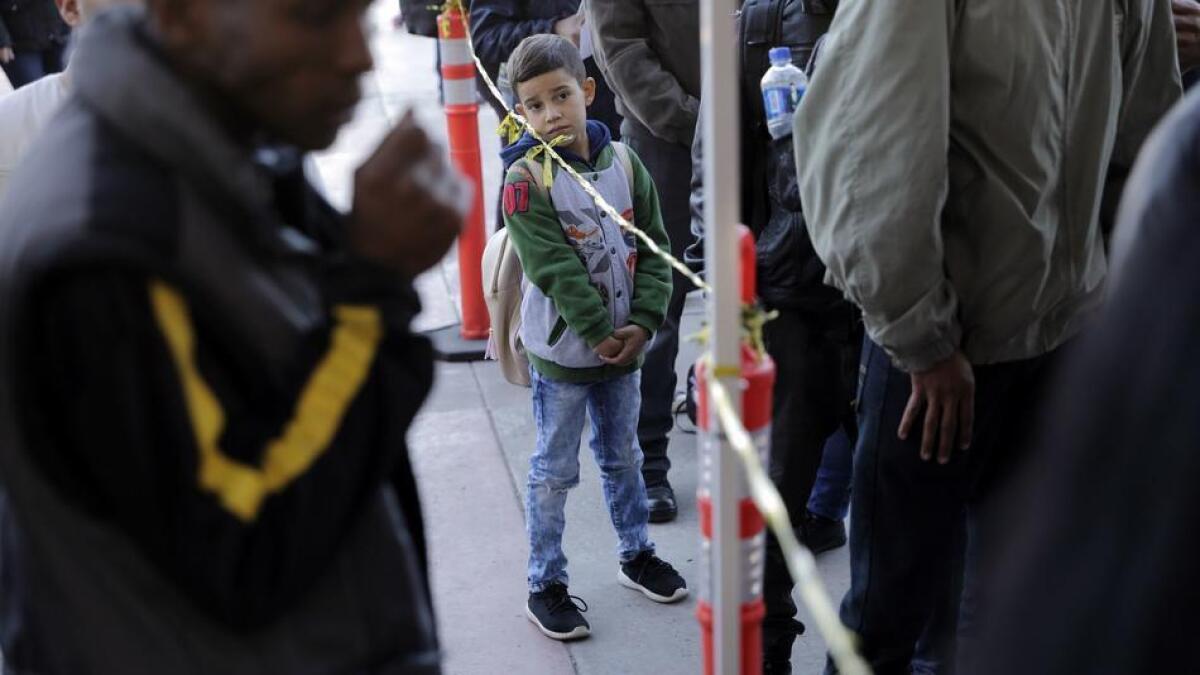ACLU sues Trump administration over policy requiring asylum seekers to wait in Mexico

- Share via
Reporting from San Diego — The American Civil Liberties Union sued the Trump administration this week over its recent policy that returns asylum seekers to Mexico while they wait for their cases in U.S. immigration court.
The ACLU has sued over — and successfully blocked — a number of immigration policies put forth by the Trump administration. Many anticipated that the organization would similarly fight the Trump administration’s “migrant protection protocols,” known more informally as “remain in Mexico,” in federal court.
The program began as a pilot at the San Ysidro Port of Entry south of San Diego with single adults from Honduras, El Salvador and Guatemala being returned to Tijuana to wait for court dates in the U.S. A total of 73 people, including 13 children, have been returned since the program was implemented in late January.
“The Trump administration is forcibly returning asylum seekers to danger in Mexico,” said Judy Rabinovitz, deputy director of the ACLU’s Immigrants’ Rights Project. “Once again, the administration is breaking the law in order to deter asylum seekers from seeking safety in the United States.”
The lawsuit was filed in federal court in the Northern District of California on behalf of 11 returnees from Guatemala, Honduras and El Salvador. All of the returned plaintiffs, who are listed under pseudonyms in the complaint, say they fear for their lives in Tijuana.
Several said they were victims of violence in Tijuana. One said he was robbed at gunpoint and told by the robbers if they ever saw him again they would kill him. Two more said that they, along with other migrants, were threatened by local residents with sticks or rocks.
Two of the plaintiffs said they have had issues with Mexican police. One said he had to pay a bribe to police to avoid being arrested.
Another plaintiff said that on his way through Mexico he was kidnapped by a Mexican drug cartel and worries that they will find him if he stays in the country.
“Asylum seekers in Mexico face a heightened risk of kidnapping, disappearance, trafficking, sexual assault, and murder, among other harms,” the complaint says. “Lesbian, gay, bisexual, and transgender persons, as well as people of indigenous heritage, are particularly at risk.”
The complaint also says that being returned to Mexico may prevent asylum seekers from finding attorneys and getting ready for their hearings.
“Instead of being able to focus on preparing their cases, asylum seekers forced to return to Mexico will have to focus on trying to survive,” the complaint says. “These pressures may deter even those with the strongest asylum claims to give up, rather than endure the wait under such conditions.”
Homeland Security Secretary Kirstjen Nielsen said: “The Migrant Protection Protocols are a vital response to the crisis at our southern border. The Department of Homeland Security is exercising its statutory authority to help alleviate this humanitarian and security crisis and secure our nation. We appreciate the Department of Justice’s support and partnership throughout this process.”
Meanwhile, just over two weeks after U.S. officials began sending individual asylum seekers back to Tijuana while their claims are processed, the first families were returned to Mexico on Wednesday.
As rain moved in over the border region, a couple, four mothers and a total of 10 children were sent back to wait at Tijuana’s El Chaparral plaza, according to Mexican immigration officials.
Another three children were returned with families on Thursday to the plaza. At least three of the children returned so far are 5 or younger, according to Mexico’s National Migration Institute.
Asylum seekers stand in the plaza each morning to listen for their names to be called from the waiting list to ask the U.S. for protection. There were about 2,600 people on the list on Wednesday.
As word of the new policy, initially announced in December and implemented in late January, spread among those waiting to cross over the past two months, parents have worried about what would happen if they had to spend months in Tijuana while their cases were pending in the U.S.
Many of Tijuana’s migrant shelters are in violent areas. Several parents spoke of hearing gunshots at night outside shelters and didn’t want their children to have to spend more time there.
Tonatiuh Guillen, the head of Mexico’s immigration agency, said last month that Mexico would not accept returnees under 18 and would not allow the program to expand beyond Tijuana.
Trump administration officials have said they would extend the program to other ports of entry along the southwest border and that the program could grow to include people from other countries.
Morrissey and Dibble write for the San Diego Union-Tribune.
More to Read
Sign up for Essential California
The most important California stories and recommendations in your inbox every morning.
You may occasionally receive promotional content from the Los Angeles Times.










